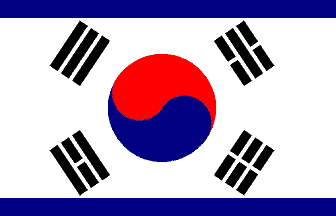 zoltán horváth
zoltán horváth
Keywords: reunification flag | korea | map:korea |
Links: FOTW homepage | search | disclaimer and copyright | write us | mirrors

Last modified: 2015-09-04 by  zoltán horváth
zoltán horváth
Keywords: reunification flag | korea | map:korea |
Links: FOTW homepage |
search |
disclaimer and copyright |
write us |
mirrors
In a recent issue of Süddeutsche Zeitung (6 Feb 2003; p. 8) there was a photo of
(South) Korean bus drivers holding flags quite similar to the "Korean Olympic flag".
The flags were used during a first test trip for a road connection between
South and North Korea; I guess, they were attached to the buses in some way, making a kind of "car flags".
The flags were square, had a thin blue border, and the blue map was more detailed.
Marcus E.V. Schmöger, 16 February 2003

image by screen name Thorondun, 05 October 2006
It is the flag of the United Republic of Korea from Dale Browns novel Battle
Born, as described on page 363: There were two dark blue bars at the top and
bottom of the banner representing the sky and strength of the earth. The white
middle section symbolized the united land. The circle in the center, the taeguk,
represented yin-yang, the power of opposites. Its red yang upper half, or
positive side, represented life, goodness and fire; the lower yin blue half, or
negative side, represented evil, death, darkness and cold. The two segments were
entwined, meaning they could never be separated. Surrounding the center circle
were the four broken-bar trigrams, taken from ancient Taoist and Confucian
thought, representing virtuous ideals important to a long and happy life. Im not
sure the sides are equally wide, so if its accepted in this manner, it may need
some minor adjustment.
Thorondun, 05 October 2006
If you're wondering whether such a flag will really be used should Korea
become whole again: I doubt it. The basic design of the flag used in the South
is the same of that of the flag of Korea before it was divided, and I expect it
will be used once more when it is united again.
If blue is added to it, it will probably be that the kwae are once more coloured
in blue, as they were in the past.
Peter Hans van den Muijzenberg, 08 January 2012
I agree with your view, in terms of real world. However I meant the
likeliness of this design within the fictional setting — maybe a stronger
presence of specific northern heritage in the fictional post-unification Korea.
Of course this design may have been chosen by the author (or someone else on his
behalf) not to specifically include an unexpected northern token but rather, out
of ignorance of the "irredentist" and pre-split nature of the South Korean flag
in real world, as a plain faced attempt at a vexillographic hybrid of the two
flags — which illustrates yet another interesting angle of fictional
Vexillology.
António Martins-Tuválkin, 08 January 2012
![[Reunification flag variant]](../images/k/kr_unific.jpg)
image located by David Martucci, 04 October 2014
at ![]() http://www.abc.net.au/news/2014-10-04/incheon-games-unification-flag/5790870
http://www.abc.net.au/news/2014-10-04/incheon-games-unification-flag/5790870
Is anyone able to read what it says on the flag?
Peter Hans van den Muijzenberg, 17 April 2015
I can't see the first word at the top of the Korean Peninsula silhouette. The
second word is 통일 which roughly translates to "unification" or "unity." The
third word is 하나 which translates to "one" or "first." And the final word is 사랑
which translates as "love." Google translates the three words we can see, 통일 하나
사랑, as "one love united," but I'm sure there's more to it than that. Wish we
could find a photograph showing the entire inscription.
Randy Young, 17 April 2015
For what it's worth, here's the official website of those games: ![]() http://www.incheon2014ag.org/ (maybe
you can find something there)
http://www.incheon2014ag.org/ (maybe
you can find something there)
Esteban Rivera, 17 April 2015
![[Reunification flag variant]](../images/k/kr_unific2.jpg)
image located by Esteban Rivera, 24 August 2015
Dean Thomas posted on April 2, 2015 on the Facebook group
 "Emblems
of the World" the link for the group
"Emblems
of the World" the link for the group
 "Flags
and Emblems of DPR Korea". In the
latter group, a member,
"Flags
and Emblems of DPR Korea". In the
latter group, a member,
 睡蓮
三つ (who labels himself as "Timmy D") posted on August 17, 2015 a link for
this
睡蓮
三つ (who labels himself as "Timmy D") posted on August 17, 2015 a link for
this ![]() news report (which
was originally posted by
news report (which
was originally posted by
 this group.
this group.
The news report does not feature the same flag as the Facebook post (a white
horizontal flag with a logo and an inscription in Korean below).
Image is screenshot from image displayed from shared link
of this news report during the 70th anniversary of the
![]() Gwangbokjeol (meaning "the day the
light returned"), also called as the National Liberation Day of Korea,
celebrated annually on August 15, here in the 2015 celebration.
Gwangbokjeol (meaning "the day the
light returned"), also called as the National Liberation Day of Korea,
celebrated annually on August 15, here in the 2015 celebration.
Source:
http://chosonsinbo.com/2015/08/py_150815/
Also, this Facebook group
 "615haewe" also features a Korean
unification flag with the Korean Peninsula in blue, in the middle of a
white horizontal flag, but without any inscription (similar to
this
one but without
the lettering) as seen in the following pictures:
"615haewe" also features a Korean
unification flag with the Korean Peninsula in blue, in the middle of a
white horizontal flag, but without any inscription (similar to
this
one but without
the lettering) as seen in the following pictures:
-
 https://www.facebook.com/615haewe/photos/pb.181460705247817.-2207520000.1440393115./927198010674079/?type=1
https://www.facebook.com/615haewe/photos/pb.181460705247817.-2207520000.1440393115./927198010674079/?type=1
-
 https://www.facebook.com/Minjogtongsin/photos/pcb.947729975265240/947729478598623/?type=1
https://www.facebook.com/Minjogtongsin/photos/pcb.947729975265240/947729478598623/?type=1
-
 https://www.facebook.com/Minjogtongsin/photos/pcb.947729975265240/947729565265281/?type=1
https://www.facebook.com/Minjogtongsin/photos/pcb.947729975265240/947729565265281/?type=1
Esteban Rivera, 24 August 2015